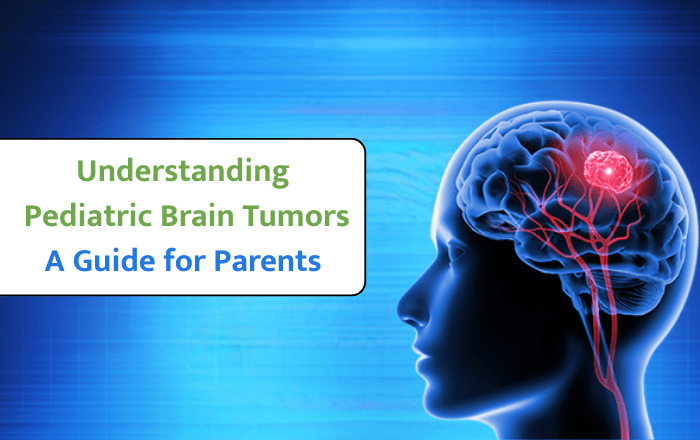Brain tumors in children are a serious but treatable condition. Early detection and proper treatment can improve outcomes. Here’s a simple Q&A to help parents understand pediatric brain tumors.
Q: What Is a Pediatric Brain Tumor?
A: A pediatric brain tumor is an abnormal growth of cells in a child’s brain. These tumors can be benign (non-cancerous) or malignant (cancerous). They can affect brain function depending on their size and location.
Q: How Common Are Brain Tumors in Children?
A: Brain tumors are the most common solid tumors in children and the second most common type of childhood cancer after leukemia. Thousands of children worldwide are diagnosed each year.
Q: What Are the Types of Pediatric Brain Tumors?
A: There are many types, but common ones include:
• Gliomas (e.g., astrocytomas, glioblastomas) – tumors from brain-supporting cells
• Medulloblastomas – fast-growing tumors in the back of the brain
• Ependymomas – tumors in the brain’s fluid-filled spaces
• Craniopharyngiomas – non-cancerous but can affect growth and vision
Q: How Do Brain Tumors Present In Children?
A: Symptoms Depend On The Tumor’s Location And Size But May Include:
- Persistent Headaches, Especially In The Morning
- Nausea Or Vomiting
- Vision Problems (Blurry Vision, Double Vision)
- Difficulty With Balance Or Coordination
- Seizures
- Behavioral Or Personality Changes
- Weakness In Arms Or Legs
- Delayed Development Or Decline In School Performance
Q: What Are The First Steps If A Brain Tumor Is Suspected?
A: The first steps include:
- Detailed medical history – To understand the pattern and duration of symptoms.
- Neurological examination – To assess motor skills, reflexes, balance, coordination, and cranial nerve function.
Q: What Imaging Tests Are Used to Detect Brain Tumors?
A:
1. MRI (Magnetic Resonance Imaging) –
- Gold standard test for brain tumors in children.
- Provides detailed images of brain tissue and tumor characteristics.
- Sometimes done with contrast (Gadolinium) for better clarity.
2. CT (Computed Tomography) Scan –
- Useful in emergency settings, especially for detecting bleeding or hydrocephalus.
- Quicker than MRI but less detailed.
Q: Are There Any Other Imaging Tools That Might Be Used?
A:
- MRS (Magnetic Resonance Spectroscopy) – To analyze chemical composition of the tumor.
- Diffusion Tensor Imaging (DTI) – Assesses white matter tracts, important for surgical planning.
- Functional MRI (fMRI) – Helps map language and motor areas if surgery is planned.
Q: Are Blood Tests Useful In Diagnosing Brain Tumors?
A: Blood tests are not typically diagnostic but may help assess general health, rule out infections, or prepare for surgery. Certain tumors (like germ cell tumors) may release tumor markers such as AFP (Alpha-Fetoprotein) and β-HCG (Beta-Human Chorionic Gonadotropin).
Q: Is A Biopsy Always Necessary?
A:
- Yes, for a definitive diagnosis. (Except in a few cases)
- A biopsy (tissue sampling) may be done surgically or through a stereotactic needle, depending on tumor location and type.
- It confirms the tumor type and guides further treatment.
Q: Are Any Tests Done To Check For Tumor Spread?
A: Yes. For some tumors (like medulloblastoma), doctors may perform:
- MRI of the spine – To check for tumor spread through CSF pathways.
- Lumbar puncture (spinal tap) – To analyze cerebrospinal fluid for cancer cells.
A brain tumor generally spreads via CSF along the neuraxis. Spread outside the central nervous system (ie brain & spine) is very rare.
Q: What Is The Role Of Genetic Or Molecular Testing?
A: Modern cancer care often includes molecular profiling of the tumor. This helps in:
- Classifying tumor subtypes.
- Predicting prognosis.
- Tailoring targeted therapies.
Q: What Is The Role Of Surgery In Treating Brain Tumors?
A: Surgery is often the first step in treatment. A neurosurgeon removes as much of the tumor as safely possible. In some cases, complete removal can cure the tumor, while in others, additional treatments like chemotherapy or radiation are needed. Sometimes surgery may be limited to acquiring tissue sufficient enough for a diagnosis (e.g. biopsy)
Q: What Are The Other Treatment Options?
A: Surgery remains the mainstay of any treatment protocol. Further treatment depends on the tumor type and may include:
• Chemotherapy – Uses medicines to shrink or kill cancer cells
• Radiation therapy – Uses high-energy rays to target tumors
• Targeted therapy – Newer drugs that attack specific cancer cells
Q: What Is The Burden Of Pediatric Brain Tumors On Families?
A: Brain tumors can cause long-term challenges, including physical disabilities, learning difficulties, and emotional stress. Treatment is often lengthy and costly, requiring specialized medical care and rehabilitation.
Q: What Is The Recovery Process After Brain Tumor Surgery?
A: Post-surgery, children may need:
- Physical therapy to regain strength and movement
- Speech therapy if communication is affected
- Occupational therapy to help with daily activities
- Regular follow-ups with MRI scans to monitor for tumor recurrence
Q: Can Children With Brain Tumors Live A Normal Life?
A: Yes! With early diagnosis, proper treatment, and rehabilitation, many children can return to school and daily activities. Advances in medicine are improving survival rates and quality of life.
Q: What Should Parents Do If They Suspect A Brain Tumor?
A: If your child has persistent symptoms like headaches, vomiting, or vision changes, consult a pediatrician or a pediatric neurosurgeon immediately. Early diagnosis can make a big difference in treatment success.
By raising awareness and supporting research, we can improve outcomes for children with brain tumors and offer them a brighter future.
Dr. Harshal Agrawal is a dedicated Pediatric Neurosurgeon in Mumbai and Thane with specialization in Brain and Spine Tumor surgery.
Conclusion :
If a brain tumor is suspected in a child, timely evaluation with advanced imaging and careful neurological assessment is critical. A combination of MRI, biopsy, and additional supportive tests leads to accurate diagnosis and guides treatment for the best possible outcome.

